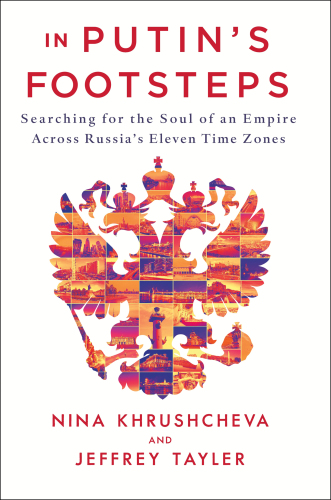
In Putin's Footsteps
Searching for the Soul of an Empire Across Russia's Eleven Time Zones
کتاب های مرتبط
- اطلاعات
- نقد و بررسی
- دیدگاه کاربران
نقد و بررسی

December 15, 2018
Two experts on Russia team up to travel across that vast nation's 11 time zones, exploring key settlements in depth along the way.Khrushcheva (International Affairs/New School Univ.; The Lost Khrushchev: A Journey into the Gulag of the Russian Mind, 2014, etc.) is the great-granddaughter of Nikita Khrushchev as well as the author of previous books about her former homeland. Atlantic contributing editor Tayler (Murderers in Mausoleums: Riding the Back Roads of Empire Between Moscow and Beijing, 2009, etc.) is an American residing in Moscow and married to a Russian woman. Current Russian ruler Vladimir Putin is the primary connecting thread in the narrative. Throughout, the authors obsessively dissect the possible meanings of his policies and practices, as do the countless Russian citizens they encounter. The authors ably capture the vastness of the cobbled-together nation, the extremes encompassed within that vastness, and how the history of trying to tame the wildly divergent population spread out massive distances from Moscow is melding with current efforts to do the same. Hardly anybody who spoke with Tayler and Khrushcheva felt shame about their nation; rather, those conversing with the co-authors tended to mingle fierce pride with an inferiority complex about the current standing of the country in the world order. They looked toward the European heritage and away from the Asian heritage while proposing that no heritage from the outside could ever negate the uniqueness of the national character. At intervals, Khrushcheva is forced to confront that her great-grandfather, along with other significant figures like Mikhail Gorbachev and Boris Yeltsin, is being erased from the historical narrative, as Putin hogs the credit as heir to Lenin and Stalin. Much of the trip, she writes in her acknowledgments, was "an exercise in survival, perseverance, professional obligation, and constant inner dialogue...about life, Russia, power, people, the Gulag, and literature."A breathtaking and occasionally exhausting journey, with candid accounts reported from each stop along the route.
COPYRIGHT(2018) Kirkus Reviews, ALL RIGHTS RESERVED.

February 1, 2019
Khrushcheva (international affairs, New Sch. Univ.;$SPACE$The Lost Khrushchev) along with author and expat Tayler (Siberian Dawn) journey across Russia, meeting locals from Moscow to Kamchatka and discussing the current state of the nation at every stop. More travelog than focused narrative, their search illuminates the mind-set of ordinary Russians and the post-Soviet experience. Their subjects are diverse, often in unfamiliar cities, and their landscape is cluttered with factories, monuments, pollution, and massive civic projects. Public infrastructure deteriorates, but the "punitive organs" are well funded. Things work, if with difficulty, and the people seem willing to express their opinions with guarded openness. The authors muse over the many cultural aspects borrowed from the West and the deep appetite for national strength and respect. In the end, they describe Russia as a diverse neo-Eastern Christian empire whose inhabitants continue to support Putin's imperial ambitions. VERDICT For students of the vast country, this is a verbose and complex narrative that will find a place in large subject collections--Edwin Burgess, Kansas City, KS
Copyright 2019 Library Journal, LLC Used with permission.

February 1, 2019
Khrushcheva (Imagining Nabokov), a New School professor of international affairs and Nikita Khrushchev's great-granddaughter, uses a New Year's Eve speech by Russian president Vladimir Putin to frame her study of the forces that have shaped Russia. The speech was supposed to have been delivered once an hour through Russia's 11 time zones, but the process proved as fractious as Russia itself.
Copyright 2018 Library Journal, LLC Used with permission.

























دیدگاه کاربران